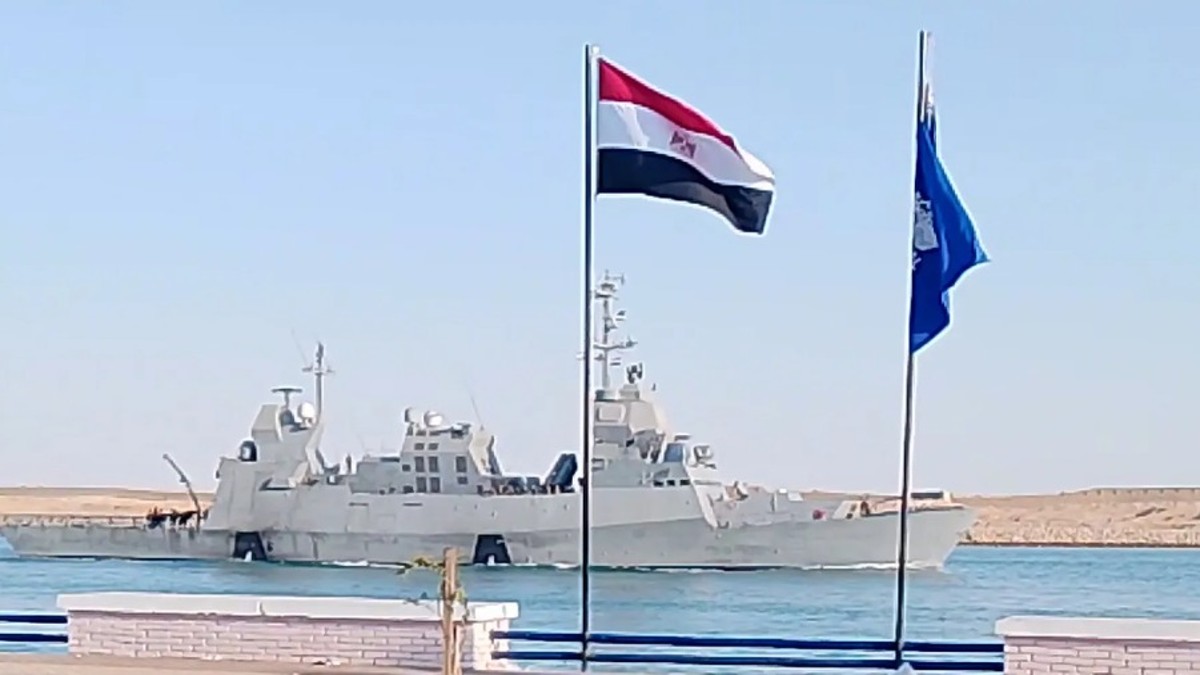An Israeli warship sailing through the Suez Canal has ignited a wave of controversy on social media in Egypt.
Tensions escalated after images emerged showing the Israeli vessel sailing south, displaying both Israeli and Egyptian flags, provoking outrage among demonstrators in Cairo.
Authorities have responded to the controversy by emphasising that all vessels have the right to transit the waterway freely.
Let’s take a closer look.
What happened?
The vessel, which sailed south from the Mediterranean to the Red Sea , flew the flags of Israel and Egypt.
According to Suez Canal rules, when a vessel is passing through the waterway, the host country’s flag must be flown alongside the country of registration’s.
To express their opposition to the vessel’s passage via the Canal, Egyptian journalists and activists staged a protest on Sunday evening outside the Journalists’ Syndicate headquarters in downtown Cairo.
They also called for the occupation’s ships to be prohibited from using the canal, expressing support with the Palestinian and Lebanese people.
“You have dragged (our nation) into the mud,” the angry crowd shouted about the government.
Impact Shorts
More Shorts“Allowing an Israeli warship to cross the Suez Canal, especially during such tough times, is outrageous and provocative,” an unnamed protest organiser told The New Arab.
Notably, the war in Gaza , which has killed over 43,000 Palestinians and spread to Lebanon in recent months, is causing anti-Israeli feelings to run strong in Egypt. Many social media users have criticised the absence of sanctions on Israel in the wake of the conflict.
Also read: How Red Sea attacks could raise export prices of Indian basmati rice
What are authorities saying?
The Suez Canal Authority of Egypt confirmed on Sunday that all vessels, commercial and military, have the right to transit the waterway freely.
_“_The Suez Canal Authority emphasises its commitment to the implementation of international treaties guaranteeing free passage to ships transiting the Suez Canal whether they are commercial or military, regardless of their nationality,” the statement read, as per National News.
Following four full-fledged wars between 1948 and 1973, Egypt became the first Arab country to sign a peace deal with Israel in 1979. However, since the outbreak of the Gaza war last year, relations have become more tense.
The internationally accepted Constantinople Convention of 1888, whose terms regulate the Suez Canal’s regulations, was cited in the authority’s statement.
The convention’s first clause declares that the waterway “shall always be free and of commerce or of war, without distinction of flag. Consequently, the High Contracting Parties agree not in any way to interfere with the free use of the Canal, in time of war as in time of peace. The Canal shall never be subjected to the exercise of the right of blockade.”
An unidentified international law expert, however, disagreed with the justification.
“Egypt was not among the signatories of the convention as a sovereign state, which, arguably, makes it unbinding to the Egyptian state,” the expert argued, while speaking to The New Arab.
“The agreement dictates that Egypt can legally ban the passage of any ships or shut down the canal in case there is a threat to its national security, which happened in several cases over the past decades,” the expert added.
Gamal Abdel-Nasser, the late president of Egypt, nationalised the Suez Canal Company in 1956 to provide funds for the development of the Aswan High Dam. Britain and France previously ran the business.
When the 1967 conflict broke out, Egypt blocked international transport through the canal. It was only reopened in 1975, during peace negotiations led by the late President Anwar Sadat, the report said.
Also read: How Houthi attacks in Red Sea are affecting India’s exports
Is Egypt supporting Israel?
The Egyptian military and the Ministry of Transport both issued separate statements on Thursday and Friday, denying any cooperation with Israel. This followed news reports that an explosives shipment headed for Israel had arrived in Alexandria, Egypt’s Mediterranean port.
“The Egyptian Armed Forces categorically deny what has been circulated on social media and suspicious accounts and what is being promoted about assisting Israel in its military operations in general and in detail,” the military said.
This statement followed a court application in Berlin by a pro-Palestinian legal group to stop a 150-ton consignment of military-grade explosives on the German cargo ship MV Kathrin. The group claimed the shipment was headed for Elbit Systems, Israel’s biggest weapons contractor.
The explosives might be used in ammunition for Israel’s conflict in Gaza, according to the European Legal Support Centre’s appeal, which might result in accusations of war crimes and crimes against humanity, according to The New Arab.
The group claimed that the MV Kathrin was refused entrance at a number of ports in Africa and Europe, including Angola, Slovenia, Montenegro, and Malta, due to the explosives that were headed towards Israel.
It further stated that for the ship to proceed, Portuguese officials recently mandated that it change its flag from Portuguese to German.
The ship in question was docked to offload cargo for Egypt’s Ministry of Military Production, and it had formally requested to leave for Turkey, Egypt’s Transport Ministry explained.
About Suez Canal
For Egypt, the Suez Canal continues to be a vital marine route and a major source of income.
However, the canal has sustained severe damage in recent months as a result of repeated attacks by the Houthis in Yemen on foreign shipping that crosses the Red Sea in retaliation for Israel’s war on Gaza.
Egypt’s president, Abdel Fattah al-Sisi, recently disclosed that the country has lost about $6 billion in canal revenue due to geopolitical concerns.
With inputs from agencies
)